Sue Burke's Blog, page 7
July 21, 2024
I’ll be at bookstores in Madrid on Friday and Saturday

If you happen to be in Madrid, Spain, this week, so am I!
If you speak Spanish, come to Estudio Escarlata at 7 p.m. Friday, July 26, at calle Andrés Mellado 52. As you may know, Semiosis is now available in Spanish — with a wonderful translation by Rafael Marín.
If you prefer English, come to the Secret Kingdoms bookstore at 8 p.m. Saturday, July 27, at calle Moratín 7. I’ll be talking about my books, naturally — followed by drinks and snacks.
As you may know, I lived in Madrid from 2000 to 2016. I’m excited to be back among friends in the city I love!

July 12, 2024
An excerpt from ‘Usurpation’
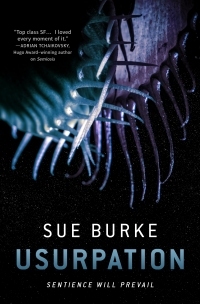
Here’s an excerpt from the novel Usurpation , which will be published in October in hardback, ebook, and audiobook (in preparation). You can preorder your copy now.
CHAPTER 3 – Year 2885 CE – Pax Institute, Bayonne, France – LEVANTER
She has arrived, the new director of the Pax Institute, and I will be destroyed. She confirms her credentials with the building and walks through the front door.
She is going to take my place. She will find out that I, Levanter, am not a human being. Foolishly, I used my real name to declare myself director, the name Mirlo gave me three centuries ago. He planted seeds he brought from the planet Pax, and I and my two sisters now grow here at the institute’s garden. My name is in the record’s big clumsy library in too many places to erase before she accesses the system. It is even on a sign in the garden in front of my main stalks. She will discover that Levanter is a rainbow bamboo.
No one knows we are intelligent. No one can know. Bamboo grow all over the Earth, and humans would kill us all if they knew. Not all humans are killers, but some are, and they have proven themselves efficient.
July 10, 2024
Meditate like the stars
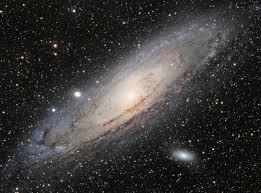
How do you meditate? Sitting still, eyes closed? That’s one way to do it: We can imagine ourselves serene like the stars overhead, moving in stately, measured rhythms. We breathe in and out, and they rise and set.
Or we could meditate like the stars as seen from another point of reference, dashing to and fro frenetically. Our Sun moves at 43,000 miles per hour. Nearby Barnard’s star is moving away from us at 200,000 miles per hour, while a star called Ross 128 is moving toward us at 69,000 miles per hour. Stars race through the sky, and they outnumber all the grains of sand on all our beaches. Their heavenly haste creates the galaxies that fly like hurricanes across the cosmos.
You can sit still to meditate. Or you can emulate a star and race like a cannonball from place to place, tugged throughout your journey by bodies as small as a planet or as large as the black hole at the center of a galaxy. Your course will be constantly modified by outside forces as you career past them.
Movement is beauty. Speed is ecstasy. Stars never travel alone and never make the same journey as their neighbors — and here on Earth, every moment of their voyages are tracked with scientific awe.
You can be like them. Savor tomorrow morning’s mad rush. Imagine yourself as a star while you move fast and phrenetic, your destination subject to constant influence and change.
Meditate on your blazing, ecstatic celerity toward parts unknown. You will be heavenly.
July 2, 2024
“When Star-Stuff Tells Stories” – now on sale

“If and when aliens make first contact, who should answer? Maybe humankind should turn to people like me, translators of science fiction. We’ve already thought through this kind of problem.”
That’s the opening sentences of my essay When Star-Stuff Tells Stories: Translating science fiction as a metaphor of technology and wonder. Calque Press has just published a limited edition of it as a 24-page pamphlet, and you can learn more and buy it here.
It’s one of a series of essays and other short works published by Calque. They’re meant to provide an opportunity for writers to think aloud about their own experiences and knowledge — and they are beautifully printed on high-quality paper. The publisher is fussy about the look and feel.
Here’s Calque’s description of When Star-Stuff Tells Stories:
Starting from the very earliest forms of human communication, the ways in which language developed into languages, and created the role of the translator, Sue Burke offers an invaluable guide to the importance and difficulties of translation on Earth, and gives us fascinating speculation about what might happen if we ever do come into contact with extraterrestrial intelligence. This pamphlet addresses questions of what communication is, and how the translator is uniquely positioned to work at escaping the bounds of the medium and bringing pure meaning into an intelligible form.
June 26, 2024
My choices for the Hugo Award Best Novella
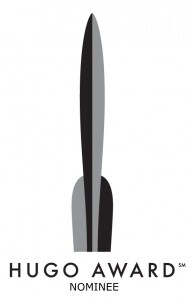
As a member of the Glasgow 2024 Worldcon, I’ve been reading for the Hugo Awards. Novellas are little novels (as the name implies) between 17,500 and 40,000 words. I think of it as short enough to explore an idea with urgency but long enough to explore the idea with depth.
As with the categories of novelette and short story, I was pleased to see that Chinese fans from last year’s Worldcon were able to nominate works they found worthy. But I’m afraid I question their judgement now.
My ballot:
1. Rose/House by Arkady Martine (Subterranean) — A detective investigates a murder in a dead architect’s landmark creation, but the house is haunted by a mad AI. The tense, creepy story is told with haunting, lyrical prose and features a variety of well-drawn characters.
2. Mammoths at the Gates by Nghi Vo (Tordotcom) — Cleric Chih returns to the Singing Hills Abbey, and war mammoths are menacing the gate. This installment in the Singing Hills Cycle is a quiet story about grief, memory, and family, with a beautiful twist at the end. It was also a Nebula Award finalist.
3. Thornhedge by T. Kingfisher (Tor, Titan UK) — A knight, a half-fairy, and a changeling walk into a story … and something luminous happens. Fairies and humans mix disastrously, though. The sorrow is palpable and deftly told. It was also a Nebula Award finalist.
4. The Mimicking of Known Successes by Malka Older (Tordotcom) — It’s billed as “a cozy Holmesian murder mystery and sapphic romance, set on Jupiter,” and that’s what it is. The story moves slowly, however, and has some plot holes. This was also a Nebula Award finalist.
5. No Award — As the rules say, “If you vote for No Award … it means that you believe the finalists you placed above No Award were worthy of a Hugo, but that those not placed above it were not worthy.” The translation of these stories is a bit too literal, but that’s not the problem.
“Life Does Not Allow Us to Meet” by He Xi, translated by Alex Woodend (Adventures in Space: New Short stories by Chinese & English Science Fiction Writers) — Humanity is colonizing distant planets, but it cannot tolerate competition. A team is sent to judge whether the pioneer species of one of the planets qualifies as human. This could have been an interesting story except for the stilted dialogue, wooden characters, infodumping, and a plot hole that caused genocide.
“Seeds of Mercury” by Wang Jinkang, translated by Alex Woodend (Adventures in Space: New Short stories by Chinese & English Science Fiction Writers) — A life form that lives in molten metal is discovered and sent to live on Mercury. A rich man accompanies them, and a society develops on Mercury. Good ideas, although not terribly original, but clumsily told. Good ideas are not enough to win my vote. Ideas must be paired with good storytelling.
June 19, 2024
My ballot for the Hugo Award for Best Novelette

Because I’m an attending member of this year’s Worldcon in Glasgow, Scotland, in August, I get to read and vote for the Hugo Awards. They’ll be presented at a formal ceremony on Sunday evening, August 11, and I’ll be there.
I was pleased to see a Chinese finalist this year, along with a mix of fantasy and science fiction. The voting is ranked-choice, and here is my ranking. As I read the stories, I considered how strong I felt the endings were and used that as a basis for my decisions, but of course, your judgement may vary.
6. “One Man’s Treasure” by Sarah Pinsker (Uncanny Magazine, January-February 2023) — Trash collectors face dangers as they pick up household waste that includes discarded magic. A cute story with dark themes.
5. “The Year Without Sunshine” by Naomi Kritzer (Uncanny Magazine, November-December 2023) — A catastrophe fills the air with ash and causes a major societal breakdown, and a Minneapolis neighborhood comes together to help everyone living there survive. More seems to be happening beyond the neighborhood, but like the cause of the catastrophe itself, no one in the neighborhood seems to talk about it. This is a cozy catastrophe and a paean to good will. It won the Nebula Award this year.
4. “Ivy, Angelica, Bay” by C.L. Polk (Reactor Magazine 8 December 2023) — Witches battle for control of a neighborhood. Beautiful imagery and a compelling story.
3. “On the Fox Roads” by Nghi Vo (Reactor Magazine 31 October 2023) — Bank robbers in the American Midwest tap into roads the rest of us never see despite — or perhaps because of —their dark, dangerous beauty. The roads lead to the unexpected.
2. I AM AI by Ai Jiang (Shortwave) — A gig cyborg worker who is a writer struggles to survive at the edge of an inhumane, predatory city. Could her life be better if she shed her humanity and became a true AI? This grim dystopia feels inspired by the way we treat creative work today.
1. “Introduction to 2181 Overture, Second Edition” by Gu Shi, translated by Emily Jin (Clarkesworld, February 2023) — If cryogenics is possible, what could possibly go wrong? Gu Shi lays it all out with heartfelt depth and clarity. The idea and the unique storytelling brought this to the top of my ballot.
June 12, 2024
My Hugo Award votes for Best Short Story

I’m an attending member of this year’s Worldcon in Glasgow, Scotland, in August, so I get to read and vote for the Hugo Awards. They’ll be presented at a formal ceremony on Sunday evening, August 11, and I’ll be there.
As often happens, the short story finalists overlapped with the Nebula Awards. I was pleased to see some Chinese finalists. The voting is ranked-choice, and here are my choices, but you may have different opinions — my husband doesn’t agree with me. It’s a solid ballot, and I congratulate the winner, whoever it is.
6. “Answerless Journey” by Han Song, translated by Alex Woodend (Adventures in Space: New Short stories by Chinese & English Science Fiction Writers) — Two people alone on a space journey seek answers and, instead, find something worse. A parable for our times. It’s a fine story but with a remote storytelling style.
5. “How to Raise a Kraken in Your Bathtub” by P. Djèlé Clark (Uncanny Magazine, January-February 2023) — No matter what they tell you, do not raise a kraken in your bathtub. Read the entire owner’s manual first, or else the result will be the basis of a cute old-timey story, perhaps a bit predictable but lots of fun.
4. “The Mausoleum’s Children” by Aliette de Bodard (Uncanny Magazine, May-June 2023) — An escapee from a space disaster goes back on a rescue mission. The story is told with the skill typical of Aliette de Bodard.
3. “Better Living Through Algorithms” by Naomi Kritzer (Clarkesworld May 2023) — A new app seems suspiciously and very specifically helpful. I laughed out loud. It ends with an obvious solution to app culture.
2. “The Sound of Children Screaming” by Rachael K. Jones (Nightmare Magazine, October 2023) — Not even a portal into fantasyland can save school children from an active shooter. A gut-wrenching story about our reality — the kind of story that fantasy is uniquely well-equipped to tell. It won my vote for the Nebula for being the most risk-taking among an excellent field of Nebula finalists.
1. “Tasting the Future Delicacy Three Times” by Baoshu (Galaxy’s Edge Vol. 13: Secret Room in the Black Domain) — What if technology could allow us to access the feelings of other people as they eat? Baoshu takes this idea to its logical extremes three times. You know it’s going to be bad, but how bad? Original and well-done. In the end, the originality won me over, edging out Jones’ story, but not by much.
May 29, 2024
The problems of the human heart

At the behest of a friend, I served as the fiction judge for this year’s South Warwickshire Literary Festival. I thought it would be fun, and it was. I read 136 flash-fiction stories — defined in the competition guidelines as 800 words or fewer— and I enjoyed them all. The challenging literary form of flash fiction can produce breathtaking little gems.
But which story was The Best? I winnowed them down to 51, then 18, then 5, and created a sort of spreadsheet to pick the winner based on criteria such as pacing, sensory details, dialogue, character arc, depth of conflict, motivation, emotional urgency, strength of voice, and storytelling technique. The tally was close, but a winner emerged.
In my Judge’s Report (you can read it here, halfway down the page), I discuss what matters to me the most when I write and when I read.
Decades ago, I encountered the speech by William Faulkner accepting the 1949 Nobel Prize in Literature, and he spoke of “the problems of the human heart in conflict with itself which alone can make good writing because only that is worth writing about, worth the agony and the sweat. … the old verities and truths of the heart, the old universal truths lacking which any story is ephemeral and doomed — love and honor and pity and pride and compassion and sacrifice.”
Of the 136 stories I read, the overwhelming majority dealt with those verities and truths. William Faulkner, you can rest in peace. (Your typewriter, shown in the photo, is still revered.) As proven by a little contest held in a corner of a shire in England, good writing endures.
May 22, 2024
My vote for the Nebula Award for Novella

Each year, the members of the Science Fiction and Fantasy Association choose the winners of the Nebula Awards in seven categories, including novelette (17,500 to 40,000 words). As a SWFA member, I get to read them and vote for the one I consider most deserving. Voting is closed, and the awards will be presented June 8.
One of the six nominees for Best Novella is a work of whimsical science fiction, and the rest take place in what Tolkien called secondary world fantasies: worlds that are different from our own in some way. The length allows for delightful explorations of these disparate worlds.
The Crane Husband by Kelly Barnhill (Tordotcom) — A retelling of a Japanese myth about family abuse is situated in the further abuse of corporate farming, and it recounts disturbing violence with lyrical writing.
Thornhedge by T. Kingfisher (Tor; Titan UK) — A knight, a half-fairy, and a changeling walk into a story … and something luminous happens, although fairies and humans mix disastrously. The sorrow is palpable and deftly told.
Untethered Sky by Fonda Lee (Tordotcom) — In a faraway land, rocs are trained to hunt and kill manticores, who terrorize its people. Well-told and richly detailed, following a familiar formula.
The Mimicking of Known Successes by Malka Older (Tordotcom) — It’s billed as “a cozy Holmesian murder mystery and sapphic romance, set on Jupiter.” Exactly.
Mammoths at the Gates by Nghi Vo (Tordotcom) — Cleric Chih returns to the Singing Hills Abbey, and war mammoths are menacing the gate. This installment in the Singing Hills Cycle is a quiet story about grief, memory, and family, with a beautiful twist at the end. It’s almost my vote for the Nebula, and if it’s your vote, I can’t quibble at all.
Linghun by Ai Jiang (Dark Matter Ink) — Ghosts sometimes visit the homes in a special town, and the families who cannot move on from a loved one’s death move there — where they neglect their lives as their emotions grow more ugly. This fantasy takes the saddest stages of grief to their logical end and illuminates their toxicity with incision. Original and heartbreaking.
May 13, 2024
Former neighborhood restaurant demolished: a photo report
Across the street from the high-rise where I live in Chicago, right below my living room window, there used to be a Chinese restaurant called Wing Hoe. It opened 43 years ago in building that had originally been a mansion, built in 1913. The restaurant closed in December 2020 because the owners lost their lease, and the old house was going to be torn down and replaced by a 50-unit apartment building. (Photo by Jonathan Ballew/Block Club Chicago).

Plans stalled over zoning issues, and the property sat empty. Spaces in the old parking lot were rented out. A new building plan was eventually approved by 2023, but for some reason did not move forward. Meanwhile, the owners didn’t do a great job of maintaining the property or shoveling snow.
On Thanksgiving morning, 2023, before dawn, I woke to a two-alarm fire across the street.
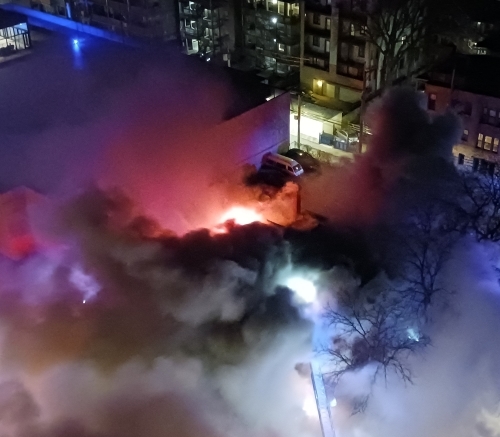

The fire department put it out quickly with no injuries or apparent damage to the cars in the parking lot. Then the building sat burned-out and untended for a while. Our alderwoman reported: “Permits for demolition have been submitted and approved for January 2024, and the subsequent construction on the building is set to commence in March, 2024.”
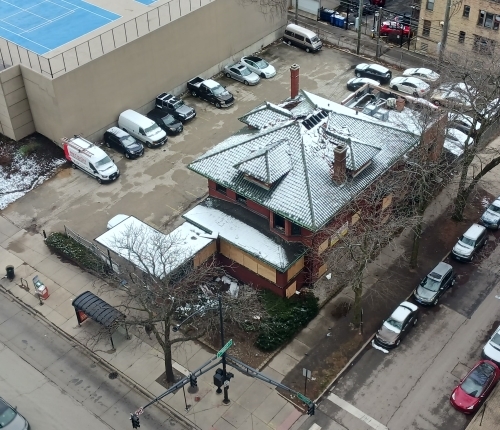
But not much was done to secure the site or clean up the broken glass, despite complaints. Nothing happened in January — or February or March. Finally, our alderwoman had enough, and here in Chicago, the local alder is a mini-mayor with real power. An emergency demolition was ordered by the city.
In the third week of April, an excavator was delivered to the property, and on April 29, a crew showed up and got to work, perhaps to the surprise of the people renting parking spots.
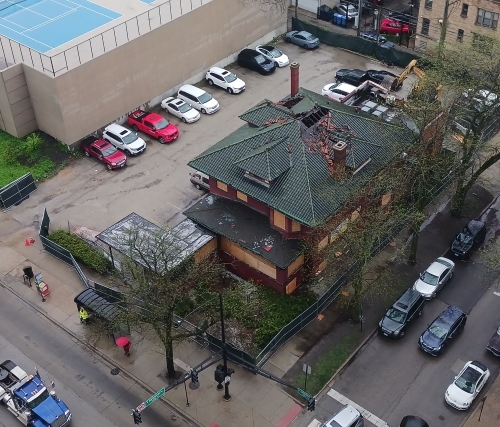

A lot was accomplished by May 1.

Historic bricks, which have a good resale value, were collected on pallets and removed on May 3.

Some of the remaining rubble was pushed into the basement and covered over with clean dirt on May 7.

On May 10, it was a parking lot again. Will the fresh soil be covered with sod or grass seed, or will it sprout weeds? Or will it attract some of the neighborhood’s ambitious guerilla gardeners?
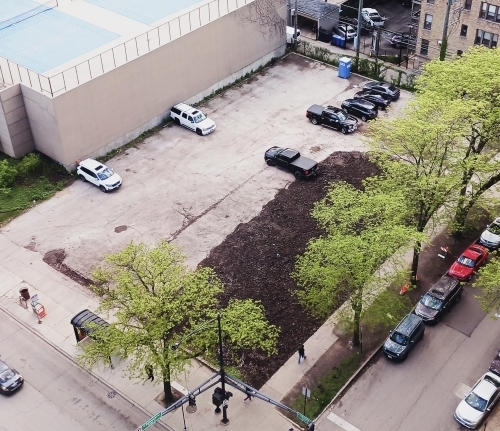
Eventually, construction will begin on a 50-unit building.

Groundbreaking was scheduled for two months ago, though. By the time it actually starts, the weeds might have grown lush and inviting to bees and butterflies. I wouldn’t mind.



